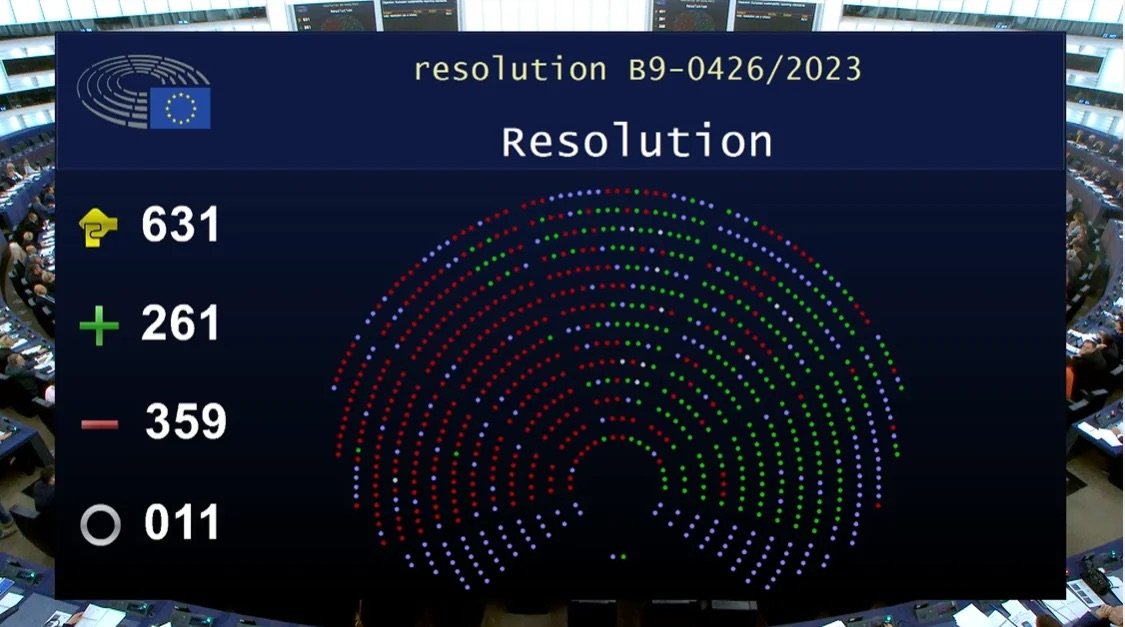EU Upholds European Sustainability Reporting Standards (ESRS) Amid Debate Over Reporting Burdens
Source: Screenshot from the live webcast at European Parliament.
In a recent development, 40 Members of the European Parliament (MEPs) proposed a motion to reject the European Sustainability Reporting Standards (ESRS). These MEPs advocated for simpler, less burdensome sustainability disclosure rules. The Parliament ultimately voted against this motion, with 359 votes against out of the 631 MEPs. On the same day however, the European Commission did announce plans to delay the ESRS implementation timeline.
What are the ESRS?
The ESRS, introduced by the European Commission in July 2023, lay out the guidelines for companies to report on their sustainability-related impacts, opportunities, and risks. These standards are a part of the Corporate Sustainable Reporting Directive (CSRD) of the EU, scheduled to take effect in early 2024. The CSRD is a significant update to the 2014 Non-Financial Reporting Directive (NFRD), which currently governs sustainability reporting in the EU. The CSRD aims to expand the number of companies required to provide sustainability disclosures from 12,000 to over 50,000 and introduces more comprehensive reporting requirements on various aspects including environmental impact, human rights, social standards, and sustainability-related risks.
Motion to Reject the ESRS
The motion to reject the ESRS was championed by a coalition of German European People's Party (EPP) and Renew members, as well as the European Conservatives and Reformists. They highlighted the absence of practical Key Performance Indicators (KPIs) for creating standardized and measurable reporting across companies. They also sought to extend the timeline for implementing the new rules, allow voluntary standards for smaller businesses, and raise the employee-based thresholds used to categorize companies. Overall, they argued that the ESRS are overly complex and place an undue burden on companies, potentially harming the competitiveness of European businesses.
However, the numbers tell a different story. A mere 0.2% of European Union companies fall under ESRS reporting requirements, with estimated implementation costs ranging from 0.017% to 0.034% of their turnovers. Eelco van der Enden, chief executive of GRI, noted how the vote to preserve the ESRS established that there is no longer an argument against implementing sustainability disclosure rules, but rather a question around how to implement them: “The endorsement of the ESRS by the European Parliament is welcome because it signals the transition from political debate to practical implementation for these new rules – which are a game changer for corporate accountability, in the EU and globally.”
Delayed Implementation Timeline
While the Parliament defended the ESRS against attempts to water down their requirements, the European Commission did announce plans on the same day to postpone the deadline for the adoption of sector-specific ESRS. These sector-specific standards are now expected to be adopted by the Commission in June 2026, while the sector-agnostic standards will still apply to 50,000 companies starting in January 2024. The delay aims to reduce the reporting burdens associated with these requirements by 25% while maintaining essential policy objectives. It will give companies time to focus on implementing the sector-agnostic standards and allow the European Financial Reporting Advisory Group (EFRAG) to develop efficient sector-specific ESRS by consolidating overlapping obligations and increasing digitisation. Similarly, the initial ESRS adoption date for non-EU companies operating in the EU will also be postponed by two years, allowing more time for non-EU companies to prepare before the reporting requirements begin in 2028.
The EU is navigating a delicate balance between creating robust sustainability reporting standards and minimizing the associated reporting burdens, all in the pursuit of a sustainable and competitive future. The European Parliament's vote to retain the ESRS and the subsequent adjustments to the implementation timeline demonstrate a commitment to foster an environment where companies can adapt smoothly to the new standards.

